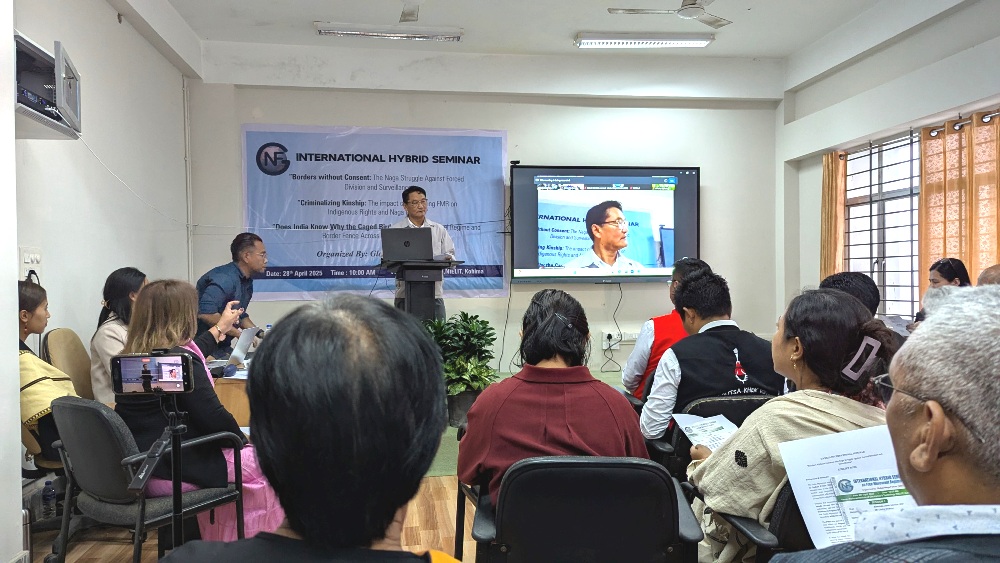
Chuba Ozukum speaking during the GNF seminar on FMR at
NIELIT in Kohima. (EM Images)
- KOHIMA — The Global Naga Forum (GNF) on Monday
issued a ‘joint recommendation’ opposing the Government of India's decision to
scrap the Free Movement Regime (FMR) and enforce border fencing and biometric
surveillance within Naga ancestral lands along the Indo-Myanmar border.
- The joint recommendation was endorsed by representatives of
diverse Naga organisations, political parties, civil society groups, students
and scholars, and solidarity partners from across Naga territories and beyond
during a seminar on “Borders without consent: The Naga struggle against forced
divisions and surveillance” initiated by the GNF at NIELIT, Meriema in Kohima.
- The joint recommendation resolved to reject all fencing and
surveillance imposed under the pretext of national security or drug control, to
defend the Naga homeland and its people through united, cross-border
collaboration, and to “resist peacefully, grounded in indigenous wisdom,
international law, and the enduring unity.”
- It stated that the Government of India must recognise that
resolving the long-standing Indo-Naga political issue is of far greater
importance and urgency than introducing new layers of confusion and unrest by
scrapping the Free Movement Regime (FMR).
Also read: Eastern Nagaland rallies against border fencing, demands Free Movement Regime
- “The Indo-Myanmar
border is an illegitimate imposition. The Naga homeland is not a buffer zone,
but the ancestral land of a people who predate modern nation-states. The
boundary drawn in 1952 was done without Naga consent and continues to divide
our land and people”, the recommendation read.
- Rejecting the scrapping of the FMR and biometric
surveillance as “violations” of human rights and indigenous rights, it stated
that such imposition on the Nagas is “oppressive” and “criminalises” the
kinship ties, restricts indigenous mobility, and erodes the way of life.
- Categorically opposing any form of border fencing or
militarised infrastructure, it stated that such actions “threaten our identity
and unity, turning our homeland into a zone of fear and control”.
- “However, this moment also presents an opportunity—a call
for unity. The widespread opposition expressed by all Naga political groups,
civil society organisations, and student bodies must now transform into
collective resistance to defend our rights and future as one people.”
- “The right to live, trade, worship, and move freely across
our ancestral land is non-negotiable. This right is not only rooted in history
but is also upheld by international instruments such as the UN Declaration on
the Rights of Indigenous Peoples (UNDRIP).”
- Emphasising that elected Naga leaders must stand with the
people, it maintained that the state government of Nagaland and all Naga
representatives—regardless of state or political affiliation—must take a firm
stand against fencing and surveillance.
- “Our unity transcends artificial borders. Whether in India
or Myanmar, we reaffirm our shared destiny as one people and reject any attempt
to divide us.
- “We seek regional and international solidarity. We call upon
indigenous networks, human rights defenders, and democratic institutions
worldwide to stand with the Naga people and hold governments accountable to
international standards,” the recommendation read.
- In his solidarity message, Atimiu Jongs, president of the
Eastern Naga Students’ Association, Myanmar, said that since time immemorial,
the eastern Nagas did not recognise the border. For them, boundary was just the
name of the mountains and valleys until the FMR issue came up.
- “FMR, actually 16 km or 30 km or whatever, is not enough for
us. Nagas should be free. Nagas should move freely within the Naga-inhabited
areas. That’s what we want to say”, he said.
- He also acknowledged that they heavily rely on the Nagaland
side for essential goods, healthcare, and education, as well as for visiting
relatives and family members.
- “This side is like a lifeline for us because the government
of Myanmar doesn’t provide enough supplies; they don’t provide enough
education; they don’t give any developments, and they don’t give proper
education. That's why for education and for our daily survival, most of the
time we depend on the western side (Nagaland)," he said.
- Pointing out that to get a border pass requires biometrics,
a process that normally takes an hour or two, he said this poses significant
challenges, especially for those seeking medical treatment or facing
emergencies.
- The 7-day validity of the border pass is particularly
problematic for patients who may require longer treatment periods and students
who cannot complete their education within such a short timeframe, he added.
- Jongs requested the GNF to urge the state government to
consider alternative arrangements, such as accepting Aadhaar cards, for school
and college admissions.
- Expressing concern over the scrapping of FMR, GNF co-convenor
Dr. Dzuvichu Rosemary said that the biometric surveillance system and other
restrictions imposed on the Naga people were like “open-air prison”.
- “It reminds us of Gaza and many other countries that have
been fenced up with borders and walls”, she said and added that Nagas cannot
afford to remain silent.
- Others who spoke (both online and offline) during the
seminar included indigenous representative from Arunachal Pradesh, Prof. Paul
Pimomo; independent researcher Lakpachau Siro; James Pochury from Bangkok;
Augustine R from Shanghai; Athong Makury from Chiangmai; and GNF convenor Chuba
Ozukum.
